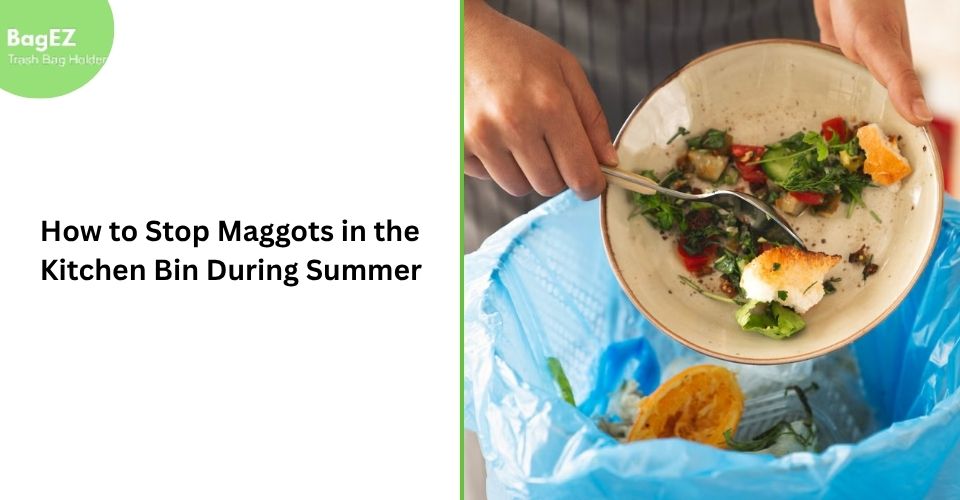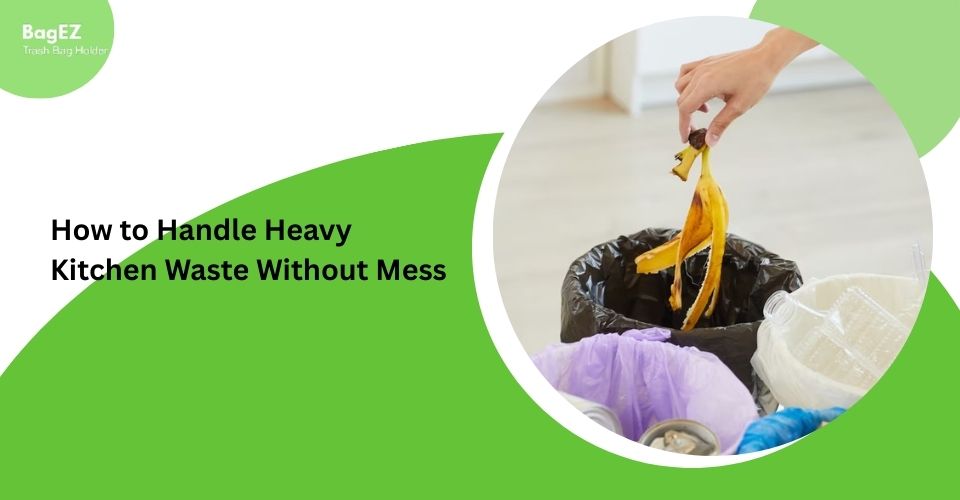Stop Maggots in Kitchen Bin- this is a phrase that sends cold shivers down the spine of any house owner, particularly when it is summer and the heat has arrived. The hot climate, though pleasant to us, provides the ideal habitat of flies and their offspring. Removing such undesired guests in your kitchen bin is a routine, but very unpleasant summer task.
The following step-by-step guide will help you learn to recognize, stop, and eradicate maggot infestation in the kitchen, making it a clean and hygienic place even during hot weather.
What Are Maggots?
Maggots are the young forms of the common flies, and they are commonly found in rotting meat. They are tiny, worm-like animals whose heads are sharp and they do not have any limbs. Their size can be very large though they are usually no more than 1 inch long as the maggots feed and develop. Initially, they are tender and white but they grow gray or black in color as they grow and their bodies become hard. Maggots are basically the cleaners of nature, which feed on rotting substances in a voracious manner, to become adult flies within a short period.
Although maggots are mostly linked to dirty environments, they possess unexpected applications. They are frequently applied in forensic entomology, or the study of insects and arthropods as applied to criminal investigation, but can have other applications as fishing bait, in the debridement of wounds, and as compost. But the fact that they are in your kitchen bin is an indication of waste management hygiene failure. After you are aware of the appearance of maggots, you can easily tell and get them out of your house. Stop Maggots in Kitchen Bin with a proactive waste management strategy.
Types of Maggots?
Maggots can have numerous types, and each one has its own peculiarities, though the most common ones in a home setting are the ones that are generated by ordinary house flies. Knowing the origin can be used to focus your preventative measures.
-
Blowfly: Blowfly maggots belong to the Calliphoridae family of flies and are usually present in rotting meat and they have a metallic look due to their shining bodies.
-
Flesh fly: Sarcophagidae family of maggots are also like the blowfly maggots, except that they are not only found in meat, but also in rotting organic material.
-
House fly: Muscidae maggots can be found in garbage and they are normally linked to unclean environments. These are the possible offenders in your kitchen bin.
-
Soldier fly: Stratiomyidae maggots feed on decaying organic matter, are employed in composting, and are distinguished by their hard, segmented bodies.
Why Do Kitchen Bins Smell More in Summer?

Bacteria are fond of the heat as we are. When the temperatures begin to increase, the level of activity of bacteria and microorganisms increases significantly, and organic matter (food scraps) breaks down much quicker. The volatile organic compounds (VOCs) are released during that process and transported by the warm air. Therefore the reason why you pick up the smell nearly as soon as you pull the lid.
The decay process also emits a pleasant combination of chemicals such as putrescine and cadaverine (they smell as ugly as they sound), and the smells are like a bat-signal to flies, ants, and rodents. Flyers are a big problem during summer. They can lay eggs in less than 10 seconds in warm weather and the eggs can be infested in a day by maggots. The best way to beat them? Avoid Maggots in your bin by making sure they do not have access to it. You must come up with a new waste disposal system.
How to Stop Maggots in Kitchen Bin
An infestation of maggots indicates that your garbage at home is too easily available and is breaking down too fast. The best approach to implement it on your own home is to use a multi-step defense strategy to deal with it.
Practical Maggot Prevention Strategies:
-
Secure and Double-Bag All Food Waste: It is important to ensure that any wet or raw scraps of food, in particular meat and fish, are wrapped in a separate, small, plastic bag and placed in the main bin. This seals the smells and avoids flies laying eggs in the food.
-
Freeze Pungent Scraps Until Collection Day: The most odorous products such as meat trimmings, bones or fish skin should be stored in a special bag in the freezer till the day of your garbage pick-up. This prevents decay and insect invasion entirely. It is quite an efficient method of using it on your own domestic garbage.
-
Rinse Food Packaging to Remove Residue: Before disposing milk containers, yogurt containers or ready-meals containers, do a quick rinse. This eliminates the appealing food waste that flies on.
-
Ensure a Tightly Closed Bin Lid: When the lid is loose or broken, it is a green light. The bin must be covered fully without any hole through which adult flies can get in and lay eggs.
-
Store the Bin in a Cool, Shaded Area: Heat will speed up decomposition. Placing your main kitchen bin in a cool dark and shady area, not in the direct sunlight, will delay the rotting process.
-
Use Natural Scent Deterrents: Flies do not like strong and natural scents. At the bottom of the bin liner put a few cotton balls wet into some of the essential oils such as mint, lavender or citronella. Sprinkling the food waste with salt or baking soda is also possible to keep the food dry and slow down decay.
-
Empty Bins Frequently: You should empty your kitchen bin much more often in the summer, preferably every 1-2 days, although you do not necessarily have to fill it. This plays an important role in ensuring that the fly eggs fail to hatch.
-
Maintain a Clean and Dry Bin Environment: In case maggots have already formed, then you should clean up the bin. Clean it with a powerful disinfectant or hot water mixed with vinegar. Importantly, make sure that the bin is totally dry and then put in a new liner since moisture is one of the greatest attractants. This is what you do yourself to make your house clean.
Why Choose BagEZ to Stop Maggots in Kitchen Bin?

When addressing the issue of kitchen bin maggots, especially in small or open areas, the selection of the waste management device is important. The BagEZ Trash Bag Holder is a special and easy way to ensure you stop in the trash bin and make it your own.
BagEZ is a small, sturdy, and diverse system that substitutes the large trash can that is hard to clean and move. It can be hung anywhere, can fit into any size bag, and does not occupy any floor space, which is why it is such a good use of it on your own decision to have a neat camp, party, or kitchen.
The secret of preventing maggots in it is that it serves two purposes:
-
Stays Open: To dispose of waste quickly and easily when cooking.
-
Keeps Bags Shut: It is easy to close the bag to minimize the odor, flies and conceal trash. This is a very simple action of ensuring that the bag is kept sealed and this action instantly prevents the access of flies to the organic matter which is the most important in preventing an infestation.
You can use BagEZ to hang your waste bag (possibly under a counter or the handle of a cupboard) and make sure that the bag is well closed when not in use to minimize the possibility of flies landing and laying eggs to almost nil. This makes your environment neat and tidy without large trash bins and offers a more convenient, cheap and cleaner waste management alternative. Keep your garbage out of reach.
Conclusion:
Maggots in your kitchen bin are an undoubtedly unpleasant aspect of summer but it is completely avoidable. The key to an insect-free kitchen is easy: deny the flies food debris and diminish the moisture and heat that accelerates fermentation. The combination of the above hygiene practices, such as freezing pungent scraps, and a tight seal can be used to effectively stop maggots in kitchen bin before they become a problem.
To have a hassle free product that helps you to secure your garbage easily, try the BagEZ Trash Bag Holder. Its two-fold use enables you to close the bag fast to minimize odors and flies making it the most convenient tool to dispose of waste easily, cleanly, and in an organized way.
FAQs:
1. What kills maggots the fastest?
A very fast-acting killer is boiling water with salt or vinegar; or sprinkled with salt, lime, or diatomaceous earth, one can effect rapid dehydration.
2. Do maggots in bins spread disease?
Yes, maggots and flies that they develop can carry pathogens such as the E. coli and Salmonella, which carry bacteria harmful to kitchen surfaces with contaminated waste.
3. How to stop maggots in a kitchen bin?
Avoid maggots: Double bag all wet food scraps, empty the bin every 1-2 days in summer and make sure that the lid is always securely closed.
4. What smells keep maggots away?
Strong and natural aromas such as Mint, Lavender, Citronella, and Eucalyptus essential oils are able to scare flies and maggots, so they can be sprayed around the bin.








